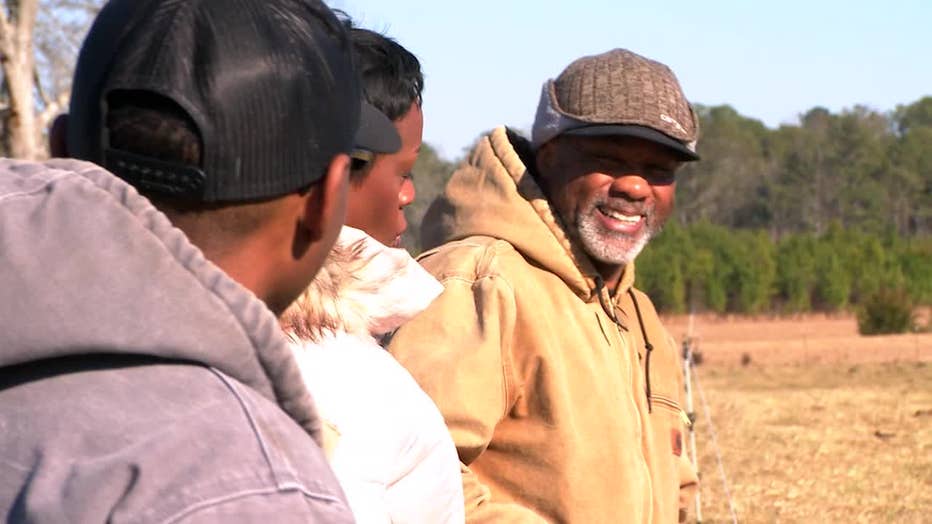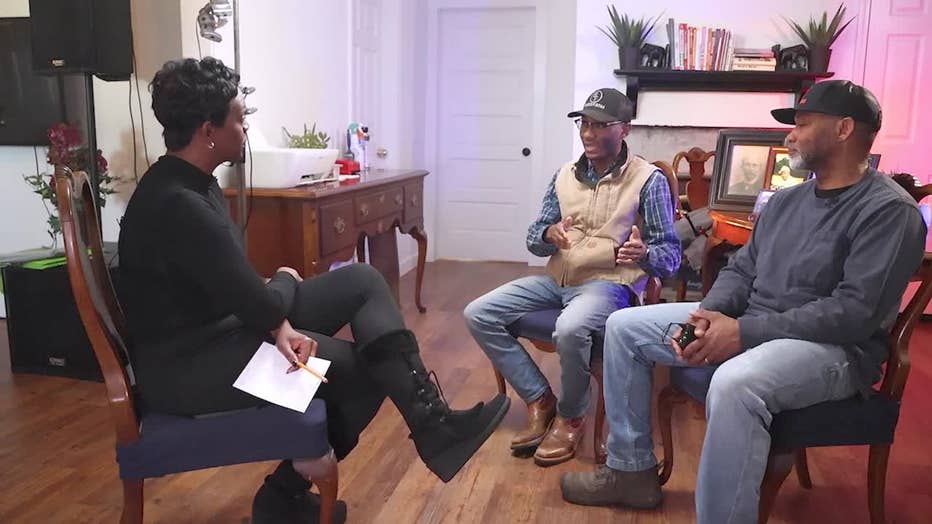The Bugg Farm: A beacon of Black farming excellence in Georgia
PINE MOUNTAIN, Ga. - It is well-documented the struggles and discrimination Black farmers have faced which caused many to lose their land. So, it’s pretty remarkable to hear the story of the Bugg Farm.
We traveled more than an hour south of Atlanta to the hallowed grounds of this farm to meet this father and son team, whose farming lineage dates back to the 1800s.
From slavery to sustainability: The remarkable journey of the Bugg Family Farm
According to the USDA, of the 3.4 million farmers across the country, only 1.3 percent is Black.

Addis Bugg and his son, also named Addis, talk to FOX 5 anchor Christine Sperow about the rich history of one of Georgia’s longest family-run Black farms. (FOX 5)
In the small town of Pine Mountain, sits more than 230 acres of farmland where the soil is not just fertile, it is rich in legacy.
Welcome to the Bugg Farm. A working Black-owned farm that has been in the Bugg family since 1874.
Addis Bugg and his son, also named Addis, first talks about his great-great-grandfather T.J. Bugg, who started it all not long after freedom for slaves became the law of the land.
"He saved up his money and bought one land lot at a time. Back then they called it a land lot, which is 200-something acres. So, he would buy a land lot and then buy another and buy another," says the younger Addis, who has researched the extensive family history.
One of T.J. Bugg’s eight children, William Wiley, inherited the farm next and was known to be a smart, independent, hard worker.
"He would wake up early in the morning when it was still dark, and he would knock on the window and tell them, ‘Hey, it’s time to start working,’ and they would farm the mules and stuff like that."
"[From] can’t see to can’t see," says the elder Addis. "That saying mean you work from dawn to dusk."
Celebrating 150 years of resilience: The Bugg Farm's enduring legacy in Black agriculture

Addis Bugg and his son, also named Addis, talk to FOX 5 anchor Christine Sperow about the rich history of one of Georgia’s longest family-run Black farms. (FOX 5)
Addis Bugg acquired the farm next and lived until 1955. It eventually got handed down to Cornelius Bugg, then to the father and son, who have been managing it since the mid-2010s.
"Dad was the kind of man you don’t just sit around, hang around not doing anything. You’re not doing anything; you’re not serving a good purpose. I saw how he was discriminated against. He was denied from getting bank loans. Now, I can only imagine what my grandfather and my great grandfather went through. But I saw this firsthand," says the elder Addis Bugg.
"It was tough. But he somehow, some way found a way."
Today, Addis and his son represent the fifth and sixth generations of the Bugg family to run the farm. After serving 22 years in the Marines, the senior Addis was actually one interview away from taking a full-time government job… until: "Had a good conversation with the Lord and say you take care of me, I will stay here on the farm, and run and operate the farm. And he bless me and taking care of me ever since."

Addis Bugg. (Supplied)
January 17, 2024, marked 150 years of this family farming legacy.
They say here in Pine Mountain: "The sun shines a little brighter on the Bugg farm" which is lighting the path their ancestors before them helped pave.
"Growing up my aunts and uncles you know they say he’s going to be the one to come back and run the farm. So, I think I was just predestined to be here anyway."
On the Bugg Farm, they produce vegetables and livestock. To this day they continue to feed the local community like their ancestors before them did. Here is a link to their Facebook page.

